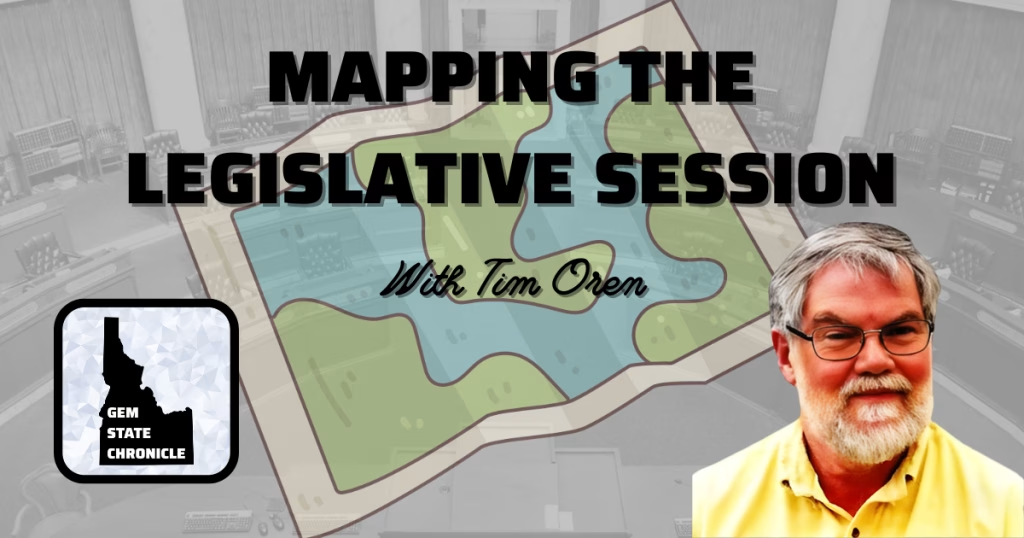We ask a lot of our elected legislators. In addition to spending 3–4 months in Boise during each legislative session, we expect them to remain on call year-round to draft airtight bills, build consensus for their passage, assist constituents with their problems, and respond to every email, phone call, and letter they receive.
During the session, legislators sit on two or three committees, each of which can review scores of bills. Members of the Joint Finance-Appropriations Committee (JFAC) are typically assigned to just one other committee due to the workload and complexity of that important position.
If a private-sector company advertised that job description for a mere $25,000 per year, it wouldn’t get a single applicant.
Yet that is the nature of service in our Republic. With great power comes great responsibility—and part of that responsibility is forgoing the wealth one might otherwise earn in the private sector.
At least, that’s how it was supposed to be. Our Founding Fathers envisioned governments composed of regular citizens, selected by their peers to serve in the legislative, executive, and judicial branches based on merit. Legislative sessions were meant to be short, so that citizen legislators could come to the capitol, conduct the people’s business, and then return to their real lives.
Technology limited the ability of legislatures to meet for more than a few weeks at a time. At the time of Idaho’s statehood in the late 19th century, telegrams and railroads handled communication and transportation, while telephones and automobiles were not yet common.
Idaho’s early legislative sessions focused on carving a new state out of unorganized territory. Lawmakers deliberated over county boundaries, municipal governance, fencing of railway tracks, marriage licenses, the structure of the public school system, irrigation, mining, and more.
Compare that with today’s Legislature, which must address far more complex and technical policy areas—healthcare, technology, regulatory code, sprawling agency budgets, immigration, education standards, and compliance with federal mandates. According to a report by the Legislative Services Office (LSO), more than a thousand pieces of legislation were introduced in the 2025 session.
We can debate whether this increased volume and complexity is good or bad, but it is our reality, so we must deal with it.
While the executive branch dramatically expanded following the New Deal of the 1930s, the Legislature lagged behind. Under Idaho’s original 1890 Constitution, the Legislature met only every other year. In 1968, voters approved House Joint Resolution 1, amending the Constitution to require annual sessions. The measure passed with 57.7% of the vote.
Even so, there’s still a great deal of resistance to the idea of a full-time Legislature. Doesn’t it feel like such a move would be a more radical departure from the citizen legislature model than the switch from biennial to annual sessions?
Rep. David Leavitt warned in a Substack article this morning that the growing number of task forces and interim committees represent steps toward a full-time Legislature:
Over the past year, a growing number of legislative groups have been created with official-sounding names: the AI Working Group, the Department of Government Efficiency Task Force, the Child Protection Task Force, and others. These are not informal brainstorming sessions. They assign members, hold livestreamed meetings, issue formal recommendations, and rely on taxpayer-funded staff and resources to operate. Yet none of them have been authorized by law or approved through a vote of the full Legislature. They are not interim committees. They are leadership initiatives, carried out in the name of government but without the consent of the governed.
Their titles are carefully crafted to sound transparent, neutral, and urgent. That is by design. It is easier to justify extra-legal governance when it comes packaged as a public service. But names do not legitimize power. Process does. And when proper process is ignored or bypassed, no amount of branding makes it legitimate. It is still a distortion of representative government. It is still Foundational Creep.
Take the time to read the whole thing.
Leavitt cites Idaho Code §67-429 as the only legal foundation he could find for interim committees not otherwise created by the Legislature. Remember that the Senate declined to take up House Bill 364, yet legislative leadership went ahead with the DOGE Task Force anyway.
Idaho Code §67-429 defines the powers and duties of the Legislative Council, which, according to Idaho Code §67-427 consists of:
…the president pro tempore of the senate, the speaker of the house of representatives, the majority and minority floor leaders of each house, two (2) senators to be selected by the members of the majority party in the senate, two (2) senators to be selected by the members of the minority party in the senate, two (2) representatives to be selected by the members of the majority party in the house of representatives and two (2) representatives to be selected by the members of the minority party in the house of representatives.
Leavitt argues that the Council is exceeding its original mandate:
But that phrase was never meant to justify the creation of pseudo-committees with official names, appointed members, paid staff, and the power to steer policy. The Legislative Council is an administrative body, not a substitute for the Legislature. It was designed to manage logistics and continuity, not to operate as a stand-in government. Yet today, it is being used precisely that way, without a vote, without a statute, and without the consent of the citizens who are footing the bill.
While he rightly notes the code is broad, it nonetheless appears to provide legal justification for interim legislative work. The Legislative Council has long functioned in this space following its creation by the Legislature in 1963. Legislative records and news coverage from the past 20–30 years show that interim committees and working groups have been a common practice.
Does it matter whether H364 passed the Senate or not? Other working groups have been created by statute, and standing committees like JFAC meet regularly in the off-season. Opposition to H364 was split, with the so-called Gang of 8 joining Democrats and a few moderate Republicans in voting no.
Again, I’m not arguing that this should be the case; only examining how things currently are. If we want to change the system, we must understand how we got here and what disassembling it would require.
The bigger question is how to rein in government as a whole, which in Idaho is dominated not by our citizen legislators but by the executive branch bureaucracy. As Theo Wold has noted, we do have a full-time Legislature in Idaho, one that is made up of thousands of agency staffers tasked with implementing policy, who are unknown to most voters.
Leavitt’s article is subtitled “Idaho’s Quiet March Toward Full-Time Government.” I’d argue we already have a full-time government, but it’s one in which the elected Legislature has the least power.
I made some of the same points during the debate over raising legislative pay from $19,933 to $25,000 per year. While I understand those who argued that the raise “grows government,” it does nothing to address what I see as the real problem, that it’s the imbalance between the Executive and Legislative branches that is actually fueling government growth.
As I said earlier, we ask a lot of our lawmakers. Much of the criticism of the DOGE Task Force has come from conservatives who argue that cutting spending is already JFAC’s job. But JFAC members are already working long hours, both during and after the session. Besides, JFAC deals with funding existing statutes—not rewriting or repealing them. If we truly want to eliminate or consolidate parts of government, that work has to happen elsewhere. We need bills, and those bills can’t be last-minute rush jobs at the start of the session.
Even in a part-time Legislature, effective lawmakers must work year-round. Just like athletes achieve victory on the practice field the week before the big game, legislators must build coalitions and draft bills well before the session starts. If you wait until after the governor’s State of the State to begin, you’ve already lost. Or, as Sun Tzu put it, “Victorious warriors win first and then go to war, while defeated warriors go to war first and then seek to win”
I remember hearing about preliminary work on House Bill 93, the parental choice tax credit, as early as spring 2024. Many legislators, including my own senator Scott Grow, spent summer and fall contributing ideas and negotiating provisions. By the time the session began, sponsors were able to present a mostly-completed bill for which they had already gotten tentative buy-in from a critical mass of lawmakers as well as Gov. Brad Little.
Showing up on day one with a great idea is not enough to actually make policy.
So are interim committees like the DOGE Task Force a waste of time and money or a valuable tool for helping lawmakers do their jobs? Only time will tell. As I said earlier this week, the proof is in the pudding. We’ll see what grows from the seeds being planted this summer and fall.
While I’m naturally skeptical of government committees, remember the DEI Working Group which met four times between October 2024 and January 2025. Despite criticism from some of the same voices now attacking the DOGE Task Force, it nevertheless produced a bill that Sen. Ben Toews was able to carry to fruition.
We say we want our lawmakers to do more—cut government, draft strong bills, and hold the bureaucracy accountable—yet expect them to do it with minimal resources and no time. I say: give the working group a chance. I’ll be at the meeting tomorrow to see how it goes.
In the meantime, the real question is what to do about government as a whole. Would curtailing the Legislature reduce the size and scope of government—or simply give the Executive even more room to grow unchecked? Is it realistic to expect lawmakers to do more while insisting they remain part-time?
Yes, Idaho’s Legislature was designed as a part-time body, but it is also the branch closest to the people. All 105 legislators face voters every two years. By contrast, our seven statewide executive officers serve four-year terms and oversee thousands of unelected staff.
As the Executive Branch has grown into a full-time bureaucracy with year-round staff, attorneys, and communications teams, legislators must stay engaged between sessions if they hope to shape policy and provide oversight. If not, they become mere spectators.
I don’t think we necessarily need a full-time Legislature, but we do need a Legislature equipped to represent the people, even if that means working between sessions.
Our foundational principle, as Americans and Idahoans, is representative government, but that doesn’t necessarily imply passive government. We need elected lawmakers to remain active outside the 90-day session not because we want a permanent political class, but because we must counterbalance the permanent executive bureaucracy.
Gem State Chronicle is a reader-supported publication. To receive new posts and support my work, consider becoming a free or paid subscriber.
About Brian Almon
Brian Almon is the Editor of the Gem State Chronicle. He also serves as Chairman of the District 14 Republican Party and is a trustee of the Eagle Public Library Board. He lives with his wife and five children in Eagle.













